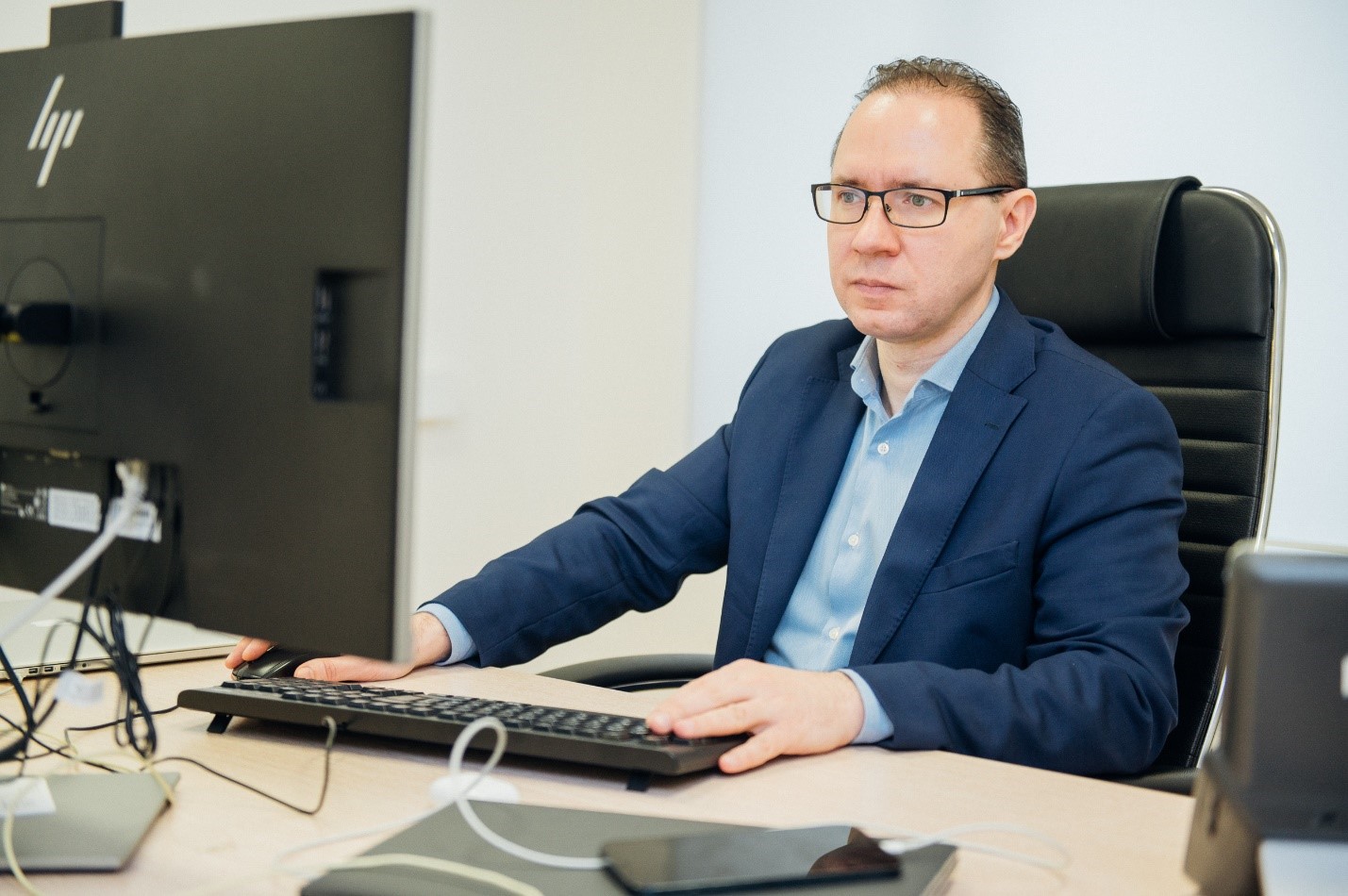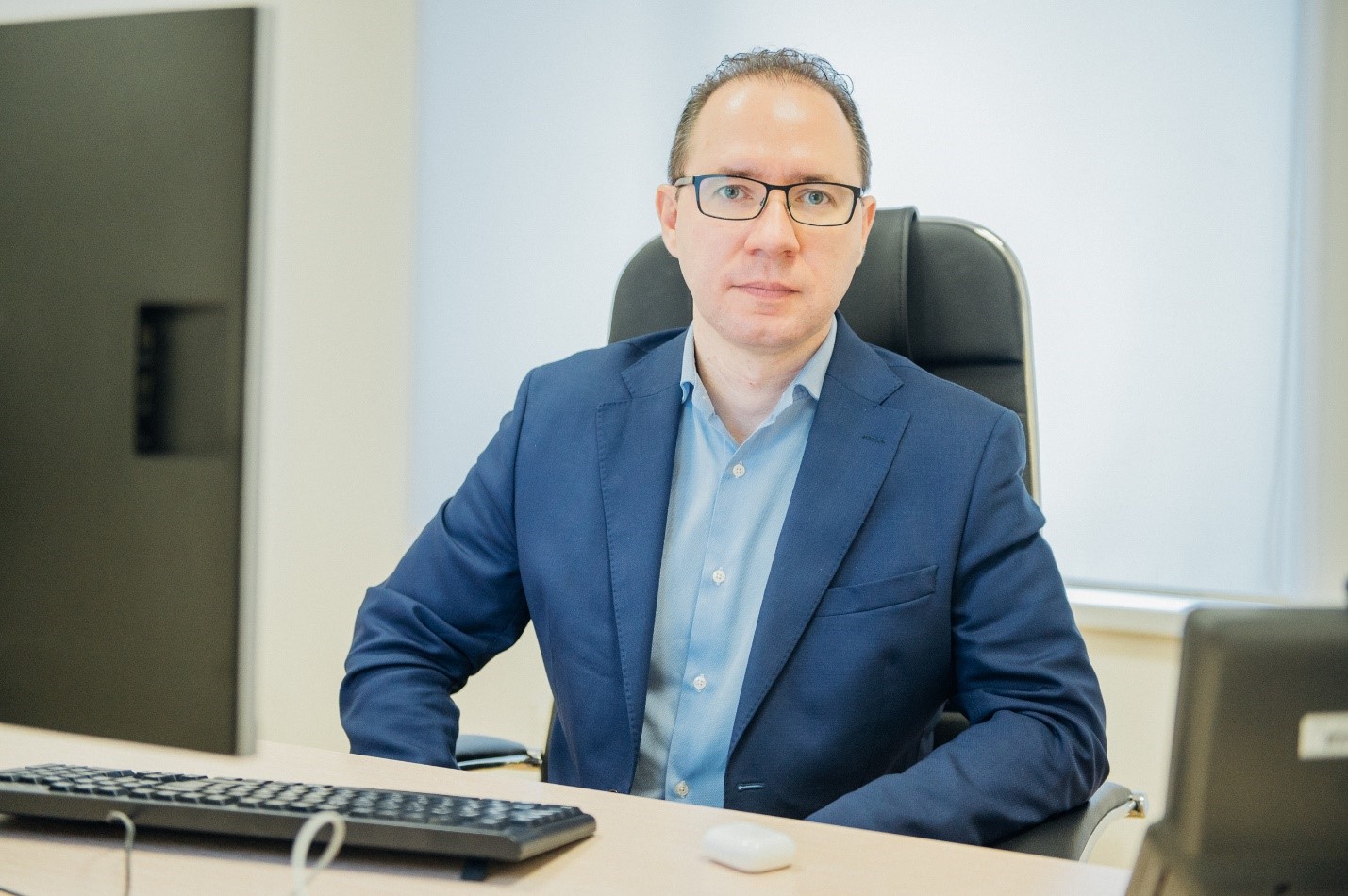'We’re Moving On to the Next Stage of Digital Transformation'
%20(1).jpg)
Dmitry Bondar has served as Senior Director for Digital Transformation at HSE University since January 2021. Since then, the university has introduced and developed numerous new, state-of-the-art information systems. Dmitry Bondar is responsible for ensuring high rates of digital transformation and the good performance of HSE's IT Office. In his interview, he speaks about the integration of new information systems, project management at the IT Office, import substitution in IT, engaging with students, and plans for the current year.
— HSE is a university committed to continually improving its digital environment. What new information systems have been launched in the past year?
— Currently, the university is working to automate its primary business processes in a comprehensive manner. In 2022, several teams collaborated to implement a number of systems, including those for managing admissions, engaging with partners, applicants and contractors, developing academic programmes, and handling procurement and financial accounting.
Our plans for this year include the implementation of several new foundational systems, such as HSE.Reg for managing student records, the Marketplace for educational products, MVP for continuing professional education, microdegree and online courses, the Joint Economic and Social Archive platform for consolidating research across various fields of science, and SmartPro, a system for automating students’ practical training. In fact, we are nearing completion of the comprehensive automation stage. This will stabilise the university's IT landscape, enabling us to advance to the next stage of digital transformation.
— What challenges do you anticipate the IT Office will encounter along the way?
— The previous stage was the most challenging one for the university. During that period, the new interfaces did not necessarily provide benefits for regular users; on the contrary, they could instead add complexity to their work. However, advancing to the next stage would have been impossible without the development and implementation of foundational information systems. The work ahead will be equally labour-intensive, but this time, the changes will have a more substantial impact on both the university's overall performance and individual users.

'We need to be pioneers in the implementation and application of domestically produced digital solutions'
— Import substitution in IT is a major priority for Russian universities today. What processes have been initiated at HSE in this regard and which ones do you anticipate will start shortly?
— Currently, the university is confronted with the unavailability of services and software from foreign manufacturers, coupled with an increase in legislative measures that require the use of domestic IT solutions. Often, we need to be pioneers in the implementation and application of domestically produced digital solutions in the educational process.
In January 2023, the IT Office uploaded a section to the HSE University's website with a list of digital services to be replaced by domestically developed solutions and the current status of their substitution
'Future human resources for the Digital Economy'
— The IT Office is a major employer. Can you tell us about your projects that aim to involve HSE students?
— Students are the most valuable resource of any university. We are particularly committed to engaging proactively with the student community.
For example, last summer, we launched the first enrolment in the IT Staff Development Programme. This internship programme offers students interested in pursuing digital professions an opportunity to start their careers in the IT industry. Students gain an insight into what it takes to practice their chosen IT profession, while also acquiring new competencies, knowledge, and skills in the field.
Based on the results of the pilot enrolment, two students were invited to join the IT Office team. We are currently conducting a second enrolment and looking forward to welcoming more talented students to the IT Office.

Another important project is the HSE University Digital Assistants. The project was initially launched to assist individuals who faced challenges in using digital technology during the pandemic.
Today, the Digital Assistants not only provide assistance and advice in Russian and English through the student-operated Hotline, but they also offer support during online events, work with digital product teams, and even provide digital support outside of the university
They collaborate with charitable foundations through digital volunteering, conduct masterclasses on digital literacy and culture, and provide support for major external online events. Moreover, digital volunteering opens up career opportunities: five students from various courses and programmes have joined the IT Office.
After gaining experience working with our team, many Digital Assistants have been hired by large IT companies. We are pleased to see our students as valuable human resources for the digital economy. We are committed to sharing our positive experience with other Russian universities through our university partnership programme. This will enable our colleagues to launch similar projects at their own institutions.
Our plans for the near future include the launch of a socially significant project called 'Supporting Digital Access to Education for People with Disabilities', which also involves the Student Council's Digitalisation Committee, Digital Assistants, and HSE students with disabilities. We still have a lot of work ahead of us to achieve our overall goals and to develop new ideas and plans for further advancing the university's digital environment.
See also:
HSE Scientists Reveal What Drives Public Trust in Science
Researchers at HSE ISSEK have analysed the level of trust in scientific knowledge in Russian society and the factors shaping attitudes and perceptions. It was found that trust in science depends more on everyday experience, social expectations, and the perceived promises of science than on objective knowledge. The article has been published in Universe of Russia.
HSE Scientists Optimise Training of Generative Flow Networks
Researchers at the HSE Faculty of Computer Science have optimised the training method for generative flow neural networks to handle unstructured tasks, which could make the search for new drugs more efficient. The results of their work were presented at ICLR 2025, one of the world’s leading conferences on machine learning. The paper is available at Arxiv.org.
Neural Network Trained to Predict Crises in Russian Stock Market
Economists from HSE University have developed a neural network model that can predict the onset of a short-term stock market crisis with over 83% accuracy, one day in advance. The model performs well even on complex, imbalanced data and incorporates not only economic indicators but also investor sentiment. The paper by Tamara Teplova, Maksim Fayzulin, and Aleksei Kurkin from the Centre for Financial Research and Data Analytics at the HSE Faculty of Economic Sciences has been published in Socio-Economic Planning Sciences.
Larger Groups of Students Use AI More Effectively in Learning
Researchers at the Institute of Education and the Faculty of Economic Sciences at HSE University have studied what factors determine the success of student group projects when they are completed with the help of artificial intelligence (AI). Their findings suggest that, in addition to the knowledge level of the team members, the size of the group also plays a significant role—the larger it is, the more efficient the process becomes. The study was published in Innovations in Education and Teaching International.
Advancing Personalised Therapy for More Effective Cancer Treatment
Researchers from the International Laboratory of Microphysiological Systems at HSE University's Faculty of Biology and Biotechnology are developing methods to reduce tumour cell resistance to drugs and to create more effective, personalised cancer treatments. In this interview with the HSE News Service, Diana Maltseva, Head of the Laboratory, talks about their work.
Master’s Students of HSE, University of Campinas, and Tsinghua University Publish Joint Student Research Collection
Master’s students of the HSE ISSEK programme ‘Science, Technology and Innovation Management and Policy’ have released a joint research collection with the University of Campinas (Brazil) and Tsinghua University (China) titled ‘Being Innovative or Being on the Safe Side—Managing the Risk of Failure.’ The authors explore how organisations perceive risks and embrace innovation within different cultural contexts.
‘A Turn Away from Stereotypes’: Moscow Hosts ‘Researching the Deaf Community’ Conference
On October 17–19, 2025, the third annual interdisciplinary conference ‘Researching the Deaf Community 2025: on the Periphery of Attention’ took place at GES-2 House of Culture in Moscow. The event was organised with the participation of the HSE International Laboratory for Social Integration Research. HSE University Vice Rector Irina Martusevich addressed attendees at the opening ceremony.
Exploring the Mind: HSE Scientists Discuss Cognitive Technologies of the Future
Why we make irrational decisions, how the brain responds to fakes, and whether neural networks are capable of thinking—these were the topics discussed by early-career scientists of HSE University during the NAUKA 0+ science festival. The event brought together students and experts from various fields, united by a common goal—to deepen their understanding of the human brain and cognitive technologies.
HSE Researchers Assess Creative Industry Losses from Use of GenAI
Speaking at the IPQuorum.Music forum on October 15, Leonid Gokhberg, HSE First Vice Rector, and Daniil Kudrin, an expert at the Centre for Industry and Corporate Projects of HSE ISSEK, presented the findings of the first study in Russia on the economic impact of GenAI on creative professions. The analysis shows that creators’ potential losses could reach one trillion roubles by 2030.
International Dialogue on Urban Development: Dynamic Urbanism and Green Infrastructure
In September 2025, the HSE Faculty of Urban and Regional Development (FURD) hosted a delegation of leading scholars and urban development experts from China. Two seminars were held at the Shukhov Lab with the participation of Chinese colleagues: the first focused on green infrastructure, while the second explored the theme of dynamic urbanism. In addition, a meeting between the Chinese delegation and representatives of FURD took place at the university’s main building on Pokrovsky Bulvar. The participants discussed opportunities for expanding cooperation between universities and research centres.


